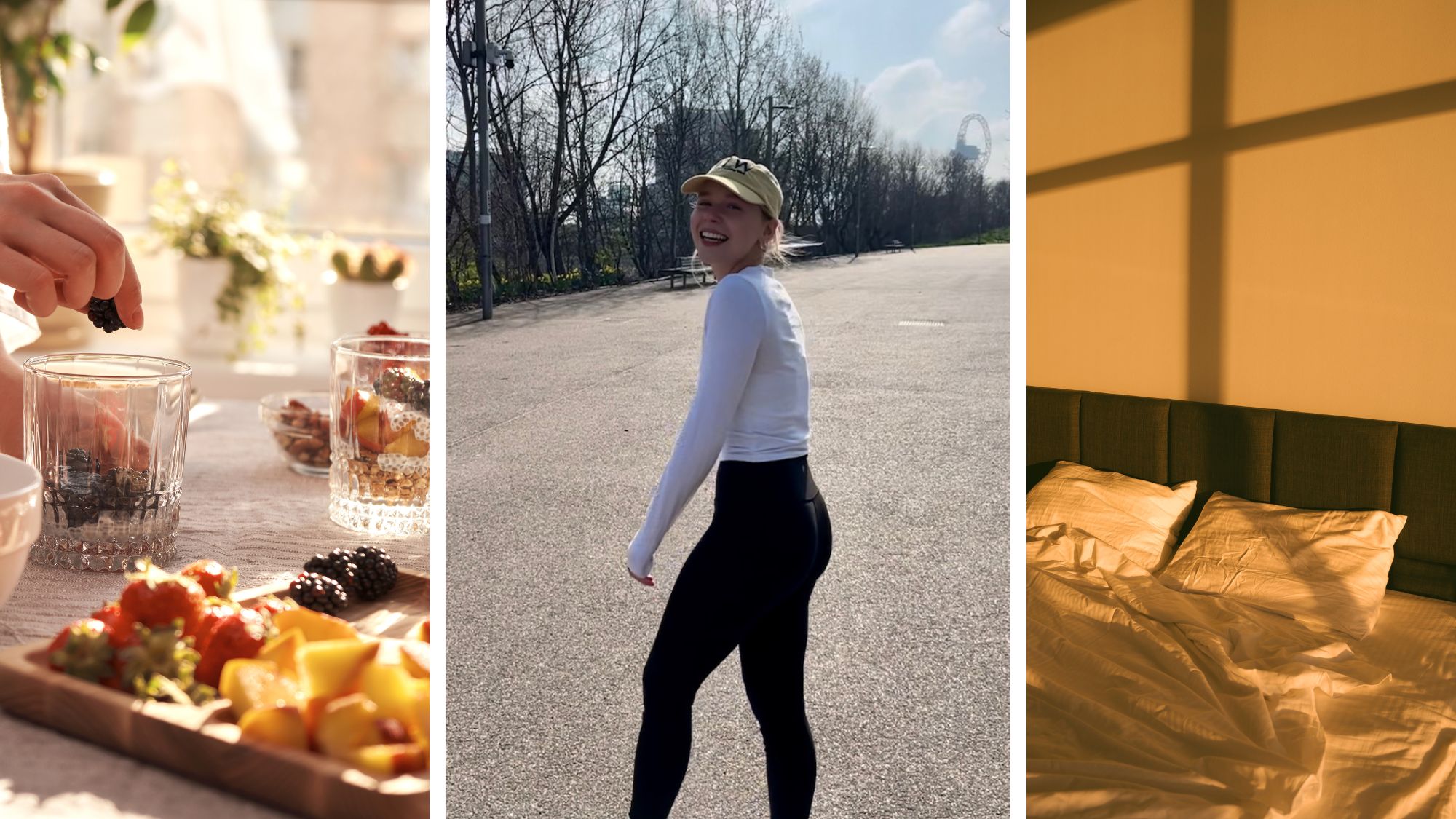As a Health Editor with nearly a decade of experience - why I've recently adopted TikTok's viral low dopamine mornings
A social media trend we really rate.


"Low dopamine mornings" isn't just another TikTok trend. Joining the ranks of eating in the morning and grounding therapy, the currently trending morning routine is social media foder we can really get on board with.
You see, how you spend your morning sets the tone for how you'll spend the rest of the day, with studies such as this Journal of Clinical Psychology paper finding that when participants meditated in the morning, they responded with greater mindfulness to daily events.
It's why morning routines are so popular online, with people knowing that if they can start the day on a positive foot, then the rest of the day will likely more easily fall into place, too. And it's why I, as a Health Editor, have always opted for morning workouts: they set me up for a positive day, knowing I've already done something great for myself.
But over the past few years, I've also learned that it's not just exercise first thing that makes me feel better in the day. Rather, when I have low dopamine mornings, I'm more focused, productive and calm in the day. And I'm not alone: on TikTok, there are millions of videos - some with over six million views - bestowing the virtues of low dopamine mornings.
But what's the science behind a low dopamine morning? And what actually are they? That's what we put to Dr Claire Vowell, psychologist and founder of The Corporate Psychologist, and neuroscientist Francisco Marques Teixeira from Alchemy Rewire. Keep scrolling for their take. And don't miss our features on dopamine fasting, plus expert-led guides to how to be happy, finding joy, the best self care ideas and self-help books, while you're here.
Your guide to TikTok's trending low dopamine mornings
What are low dopamine mornings?
Low dopamine mornings involve avoiding activities that trigger the feel-good pathways in our brains.
"Dopamine is a neurotransmitter, aka a chemical messenger in the brain that plays a number of important roles in both the brain and body," explains Dr Vowell. "It’s often referred to as the "feel-good hormone" as it’s involved in the brain’s reward system. Dopamine is released during pleasurable activities, such as eating, exercising, and engaging in social interactions, reinforcing behaviours that are essential for survival and reproduction."
Celebrity news, beauty, fashion advice, and fascinating features, delivered straight to your inbox!
However, the modern world is full of quick dopamine dumps for our minds, says Teixeira. "Typically, high dopamine activities such as checking social media, consuming caffeine or engaging in other stimulating behaviours can cause a rapid increase in dopamine levels, leading to a subsequent crash and depletion of dopamine reserves," he says.
So, low dopamine mornings involve avoiding anything that will cause a spike of dopamine, such as scrolling on your phone, drinking coffee, eating ultra-palatable foods and doing very intense exercise. Instead, you focus on slower, less instantly rewarding activities such as journalling, going for a walk, doing yoga or eating a nutritious breakfast.
What are the benefits of low dopamine mornings?
The belief is that avoiding dopamine spikes in the morning stops your mind from continually seeking them throughout the day. So, if you're someone who can't get off their phone once they've started, or often finds their mind wondering to where their next dose of pleasure is going to come from (another coffee? Another scroll? A long lunch break?) rather than the task at hand, low dopamine mornings could be for you.
"Low dopamine mornings would help individuals to conserve dopamine, maintaining consistent energy levels and concentration throughout the day," says Teixeira. "Morning dopamine regulation is crucial because it sets the tone for the brain's chemical balance for the rest of the day, influencing overall productivity and mood stability."
Dr Vowells adds: "Dopamine influences a variety of cognitive processes, such as learning, memory, and attention. High dopamine activities, which might include checking social media on your phone, early in the day can create a pattern of seeking instant gratification and distractions. In contrast, so-called ‘low-dopamine activities’, such as making your bed or gentle cleaning, can help encourage more focus, calm and productivity."
Even if you don't struggle with your attention or energy throughout the day, low dopamine morning routines could support you. "These routines can be good for people struggling with stress and anxiety as they give you a bit of space to check in with your mental wellbeing, which helps set you up for the day. Additionally, having a set routine means less decisions to make first thing and helps you to feel more in control and productive. This can have a positive impact on the rest of the day," says Dr Vowells.
However, she adds: "It should be noted that, while popular on social media, there isn't a huge amount of clinical research into the effects of a low dopamine morning. And the trend may be a somewhat simplistic understanding. While a calm morning routine definitely has benefits, there are other factors at play. For example, some of the benefits are also likely to be attributed to reducing stress (cortisol) first thing. This may well give a similar outcome and is a positive approach from the perspective of stress reduction."
Are low dopamine mornings good for ADHD?
Low dopamine mornings have become particularly popular among the ADHD community on TikTok. Again, this isn't necessarily a well-studied field, but people are sharing their anecdotal evidence of how staying off their phones and avoiding dopamine spikes first thing supports their focus for the rest of the day.
While everyone is different and what works for one person with ADHD will differ from someone else, there is some scientific suggestions that low dopamine mornings may work for those with ADHD.
"ADHD is often associated with dysregulated dopamine pathways, leading to issues with attention, impulsivity, and hyperactivity. By reducing early morning dopamine spikes, individuals with ADHD might experience more stable dopamine levels throughout the day, leading to improved focus, reduced impulsivity, and better overall mood. This approach can help in managing the symptoms of ADHD by creating a more balanced neurochemical environment," explains Teixeira.
If you're struggling with managing ADHD symptoms, it's important that you talk to your medical provider before implementing new routines.
10 low dopamine morning activities
Exactly how you spend your low dopamine mornings depends on what you need to prioritise and how you want to feel.
That said, if you're looking for low dopamine morning ideas, Dr Vowell and Teixeira suggest:
- Avoid social media and screens (even if you're not on TikTok, some people may find the news or other online areas too stimulating)
- Read a book
- Journal your feelings
- Skip caffeine
- Consume a high-protein breakfast
- Engage in light exercise such as walking or yoga
- Practice mindfulness
- Do breathwork (Teixeira's Alchemy Rewire course has been scientifically proven to decrease heart rate, increase relaxation and decrease cortisol)
- Tidy your home
- Take time on self-care (shower, skincare, etc)
I swear by low dopamine mornings - here's why
My low dopamine morning routines tend to include waking up naturally or to an alarm clock (not to my phone), making my bed, writing a to do list for the day and journalling any thoughts I need to get out of my mind. Then I'll either step outside (onto my balcony or for a walk around the block) or eat a snack and then go to the gym for a focused workout.
I notice when I do a morning routine like this, I'm able to get through everything I need to do much more efficiently and confidently. But I'm not perfect: there are many days that I start my morning with a scroll, a coffee or doing something more stimulating. On those days, I notice that it's harder to pull myself out of the pleasure cycle and get on with everything that needs to be done.

Chloe on a morning walk
Shop MC approved wellness products now:
Are there any drawbacks to low dopamine morning routines?
"Low dopamine morning routines have clear benefits and are generally considered healthy habits. In particular, avoiding mobile phone use for a period of time is a great habit to get into and would particularly help those struggling with stress," shares Dr Claire Vowell, psychologist and founder of The Corporate Psychologist.
That said, there are a few drawbacks that she can see to adopting a gentle, less stimulating morning routine. "Anecdotally, it seems that many individuals who have adopted low dopamine morning routines report improved productivity, reduced feelings of overwhelm, and better overall wellbeing, but from a science perspective, more research is needed," she stresses. "I would caution that some balance and moderation may be needed, the morning routine shouldn’t be too restrictive, or punitive, or it could become stressful in itself."

Chloe Gray is a freelance journalist who writes and talks about health, fitness, and wellbeing through a feminist lens. She was part of the launch team for Stylist magazine's fitness brand, Strong Women, and has written for i news, Women's Health, Red magazine, Good Housekeeping, Refinery29, and more. She's all about building mental and physical strength, eating delicious food that fuels you well, and making the fitness industry more accessible and enjoyable. She's also a qualified fitness trainer and research nerd, so you can be sure everything you read is backed by proper science.


